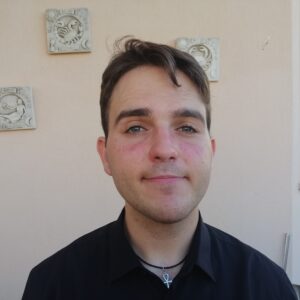|
Carlos Rabadán Salas Viola Spain Age: 25 Ernest Bloch Robert Schumann |
Carlos Rabadan was born in 1999 in Mallorca. At the age of 8, he began his musical training, choosing the viola. He completed his Professional Degree and Bachelor Degree in Music at the Conservatory of Music of the Balearic Islands with professors such as Mª José Gómez and Sonia Krasnova and have received lessons with Isabel Villanueva, Mikhail Zemtsov, and Julia Dinerstein. Now he is studying his second year of his master degree at the Irish World Academy with Joachim Roewer.
During his training, he played in orchestras such as the Orquestra de Cambra de Mallorca, the Ensemble Tramuntana and the Orchestra Lauseta, where he had the chance to play Stamitz’s viola concerto as a soloist. His musical interests are very broad, ranging from the more common repertoire for classical-contemporary viola, the stylistic study of early music, to the exploration of other musical genres such as trad and jazz. |
| Programme Notes
In today’s program, we will encounter three works from very different genres. The Adagio and Allegro by Robert Schumann (composed in 1849) is undoubtedly an excellent example of mid-19th-century German Romanticism. We can find a sense of intimacy and sensitivity characteristic of the style in the first part, and great vitality in the allegro. The original work was composed for the horn, but it is now performed on many instruments. The second work, the Hebraic Suite by E. Bloch, revives and brings to classical music the sound of Jewish folklore and religiosity. In the twentieth century, many composers like B. Bartók or Ginastera became interested in traditional music in search of their identity to form their own language. Bloch, in this case, does so with the music of the Jewish people, as the composer had to live much of his life in exile in the United States due to the extreme anti-Semitism prevailing in Europe in the middle of the last century. |
|
- Registration Form
- Final Details and Agreement Submission
- Semi-final Programme Details (18-20 mins)
- Welcome to the registration page for the Irish Freemasons Young Musician of the Year Competition.
- Final Programme Details (25-30 mins)
- Course and College/University Details
- Many thanks for submitting your application.

